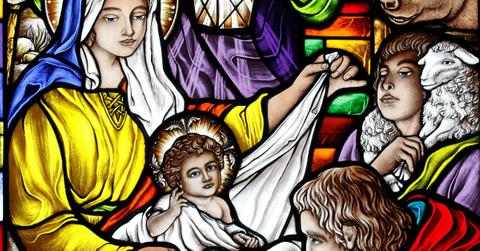Was Jesus Christ Actually Born on Christmas? Theories About Jesus' Real Birth Date Explained

Historians widely agree Jesus Christ was likely not born on December 25, or even in the year 1 A.D.
Dec. 25 2023, Published 9:05 a.m. ET
Christmas, celebrated by millions on Dec. 25, marks the birth of Jesus Christ in the year 1 A.D. However, historical and religious experts widely assert that Jesus likely wasn't born on this date, and theories from a wide array of historical records contribute to the longstanding mystery.
The Roman Catholic Church designated Dec. 25 as the date of Jesus' birth, a decision believed to be tied to an annual mid-winter pagan festival, the Saturnalia festival.
This festival coincided with celebrations of the Roman sun god, leading many to speculate that the date of Christmas was intertwined with these festivities.
A 2016 essay by Candida Moss, a professor of Theology at the University of Birmingham, proposed an alternative explanation, according to The Washington Post.
Moss posited that Dec. 25 was chosen because it is exactly nine months after March 25, which is considered the likely date of Jesus’ crucifixion. According to Moss, as Christians developed the theological idea that Jesus was conceived and crucified on the same date, they set the date of his birth nine months later.
Theories regarding the actual birth year of Jesus range from 6 B.C. to 4 B.C., based on the biblical tale of King Herod the Great. The story states that just before Herod's death, he ordered the killing of all male infants under 2 years old in an attempt to eliminate Jesus.
The commonly accepted year of King Herod's death is 4 B.C., but a lack of contemporary evidence has cast doubt on this, according to LiveScience.com.
Other theories consider astronomical events. In the 1990s, an astronomer suggested that the Star of Bethlehem, which marked the birth of Jesus, might have been a comet documented in 5 B.C. However, this theory has largely been debunked.
Never miss a story — sign up for the Front Page Detectives newsletter. Be on the scene the moment news breaks.
Some scholars propose that the Star of Bethlehem was a bright light formed by Jupiter overlapping with another planet, either Venus in June of 2 B.C. or Saturn in October of 7 B.C.
In Jesus the Jew: Reality, Politics, and Myth-A Personal Encounter, author Ignacio L. Götz argues for a spring birth based on the tradition of fall pregnancies following harvests.
Despite the multitude of theories, religious experts seem to agree on one point: the actual date of Jesus' birth remains uncertain.
Become a Front Page Detective
Sign up to receive breaking
Front Page Detectives
news and exclusive investigations.
